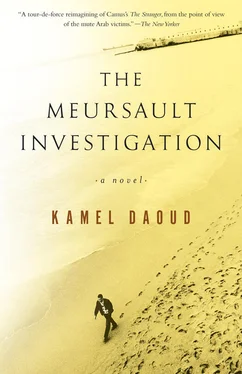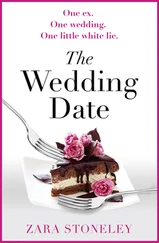It was that muffled noise that woke me up. At first I thought it was a wild boar, or maybe a thief. In the darkness, I knocked softly on the door of my mother’s room and then opened it; she was already sitting up in bed, staring at me like a cat. I removed the gun, gently, from the knotted scarves it was concealed in. How did we happen to have it? Pure chance. I’d found it two weeks before, hidden in the rafters of the shed. It was a heavy old revolver that looked like a metal dog with one nostril and gave off a strange odor. I remember its weight that night, not pulling me down to earth but toward some obscure target. I remember I wasn’t afraid, though the whole house had suddenly become unfamiliar again. It was almost two in the morning, and only the barking of dogs in the distance marked the frontier between the earth and the night sky. The sound came from the shed, and it already had a smell, and I followed it with Mama close behind me, clutching the rope around my neck more tightly than ever, and when I got to the shed and peered into the darkness, the black shadow suddenly had eyes, then a shirt, the beginnings of a face, and a grimace. The man was there, wedged between two stories and some walls, and his only way out was my story, which left him no chance. He was breathing with difficulty. Of course I remember his eyes, his gaze. To tell the truth, he wasn’t looking at me. He seemed hypnotized by the heavy gun in my fist. I think he was so frightened he couldn’t be angry at me or reproach me for his death. If he had moved, I would have struck him and laid him out flat, facedown in the night, with bubbles bursting on the surface around his head. But he didn’t move, at least not in the beginning. “All I have to do is turn and walk away, and it’ll be over,” I told myself, not believing it for a moment. Mama was there, forbidding any attempt of mine to dodge away, and demanding what she couldn’t obtain with her own hands: revenge.
We exchanged no words, she and I. All of a sudden we tipped over, both of us, into a kind of madness. I’m sure we both thought about Musa at the same time. This was our opportunity to be done with him, to give him a worthy burial. It was as if our lives since Musa’s death had been nothing but playacting, a barely serious reprieve, and all we’d really been doing was waiting for that roumi to come back on his own, returning to the scene of the crime, which we carried along with us wherever we went. I took a few steps forward, feeling my body stiffen with refusal. I wanted to fight through that resistance, and I took one more step. That was when the Frenchman moved — or maybe he didn’t even do that — and retreated into the shadows in the farthest corner of the shed. All I could see was shadow, and every object, every angle and curve stood out so confusedly it insulted my reason. Because he’d backed away, the darkness devoured what remained of his humanity; all I could see now was his shirt, which reminded me of his empty eyes that morning — or the morning before, I couldn’t remember.
It was like two sharp raps on the door of deliverance. That, at least, is what I thought I felt. Afterward? I dragged his body into the courtyard, and then we buried him. It’s not as easy to bury a dead man as books and movies would have you believe. The corpse always weighs twice as much as the living person did, refuses the hand you offer it, and adheres with all its blind weight to the surface of the earth, clutching whatever last bit it can reach. The Frenchman weighed a lot, and we had no time. I dragged him about a meter before his reddened, bloody shirt tore. Part of it remained in my hand. I exchanged two or three murmurs with Mama, who seemed already to be elsewhere, not much interested anymore in the universe she bequeathed me like an antique stage set. I used a pick and a shovel and dug a deep hole very close to the lemon tree, the sole witness to the scene. Oddly enough, I felt cold, even though we were in the heart of summer, even though the night was hot and as sensuous as a woman who’d waited too long for love, and I wanted to dig and dig and never stop or raise my head. My mother suddenly snatched up the torn piece of shirt lying on the ground and sniffed at it for a long time. That seemed to give her back her sight at last. Her eyes fell on me, practically surprised.
And after that? Nothing happened. And whereas the night — its trees plunged into the stars for hours, its moon, the last pallid trace of the vanished sun, the door of our little house, which forbade time to enter it, and the blind darkness, our only witness — whereas the night was gently beginning to withdraw its confusion and give things back their angles, my body was able to recognize the arrival of the denouement at last. It made me shiver with an almost animal delight. Lying on my back in the courtyard, I made an even denser night for myself by closing my eyes. When I opened them, I remember seeing yet more stars in the sky, and I knew I was trapped in a bigger dream, a more gigantic denial, that of another being who always kept his eyes closed and didn’t want to see anything, like me.
I’m not telling you this story to be absolved a posteriori or to get rid of a bad conscience. At the time when I did that killing, God wasn’t as alive and heavy in this country as he is today, and in any case, I’m not afraid of hell. I just feel a kind of weariness, a frequent urge to sleep, and sometimes severe vertigo.
The day after the murder, everything was intact. The insects were chirring as deafeningly as always, and the sun was beating down strong and straight, planted in the heart of the earth. Maybe the only thing that had changed for me was the sensation I’ve already described to you: At the moment when I committed my crime, I felt a door somewhere was definitively closing on me. I concluded that I had been condemned — and for that, I’d needed neither judge nor God nor the charade of a trial. Only myself.
I’d love to have a trial! And I assure you: Unlike your hero, I’d go on trial with the enthusiasm of a liberated man. I dream about that courtroom full of people. A big room, and Mama there, struck dumb at last, incapable of defending me for lack of a precise language, sitting on a bench in a daze, hardly recognizing her belly or my body. A few idle journalists in the back rows, as well as Larbi, my brother Musa’s friend, and especially Meriem, with her thousands of books hovering above her head like butterflies. And then your hero, playing the role of the prosecutor in this unique remake, asking me my family name, my given name, and my ancestry. Joseph, the man I killed, is also present, and my neighbor, the horrible Koran reciter, who comes to my cell to explain to me about how forgiving God is. A grotesque scene, because the background’s missing. What could I be accused of, me, who served my mother even after my death, and who buried myself alive before her eyes so she could live in hope? What will my accusers say? That I didn’t weep when I killed Joseph? That I went to the movies after firing two shots into his body? No, there were no movies in those days, and the dead were so numerous that nobody wept for them, they were just given a number and two witnesses. I searched vainly for a court and a judge, but I never found them.
All things considered, my life has been more tragic than your hero’s. I’ve interpreted all those roles in turn. Sometimes Musa, sometimes the stranger, sometimes the judge, sometimes the man with the sick dog, the treacherous Raymond, and even the insolent flute player who mocked the murderer. It’s essentially a private performance, with me as the sole protagonist. A splendid one-man show. Everywhere in this country, there are cemeteries for foreigners, places where the calm grass is only a façade. All the fine people in there are chattering and jostling one another, intent on resurrection, inserted between the end of the world and the beginning of a trial. There are too many of them! Far too many! No, I’m not drunk, I’m dreaming about a trial, but they’re all dead already, and I was the last to kill. The story of Cain and Abel, but at the end of mankind, not at the start. You understand better now, don’t you? This isn’t a trite story of forgiveness or revenge, it’s a curse, it’s a trap.
Читать дальше












